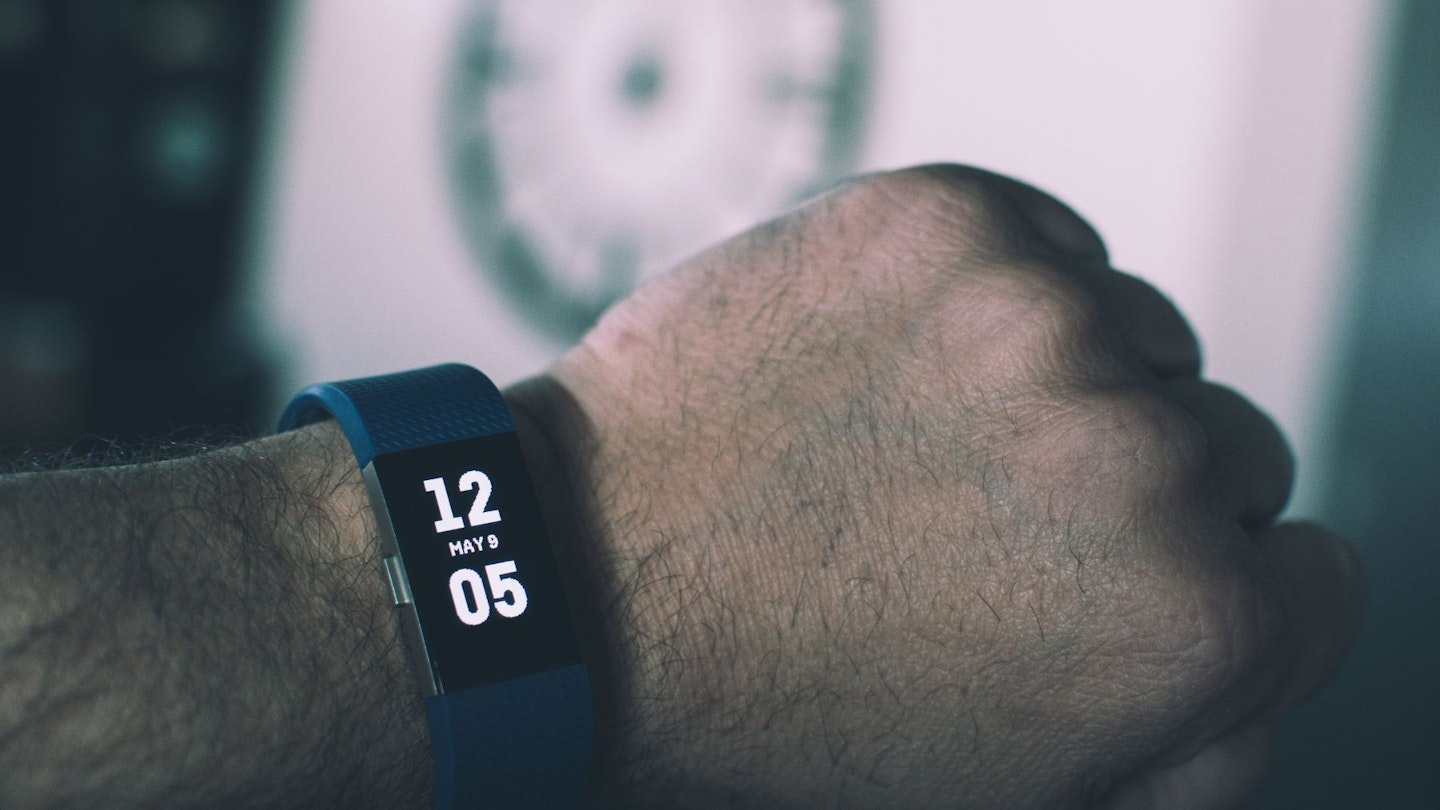Whether you’re starting out on your fitness journey or you have a well-worn regimen that you’ve followed for years, finding a way to keep track of all your hard work can be a great tool to keep you motivated. A fitness tracker is a popular way to do this, and for many, Fitbit is among the best-known brands in the sector.
Fitbit has been around since 2007 and by November 2023 had the second largest market share by any individual brand. It claimed 9 per cent of the fitness tracker and smartwatch market, second only to Apple on 19 per cent. In 2021, Fitbit was acquired by Google, and much of its health-tracking tech was subsequently incorporated into the Pixel Watch.
Fitbits have come a long way since the launch of the original Fitbit Tracker in 2009. With advanced sensors, a user-friendly app, and a relatively affordable price, there’s a reason the best Fitbits remain so popular. As the company has grown, the variety of Fitbits has expanded as well. There are now a range of fitness trackers and smartwatches to choose from. So, before you splash the cash, it’s worth taking some time to see how the various models differ and work out which one will be the best Fitbit for your needs.
Why choose Fitbit?
Fitbits offers a wide variety of health-tracking metrics, including heart rate, sleep, blood oxygen, stress, step count, and estimated calorie burn. The Fitbit app then interprets all that data to provide plenty of added insights, allowing you to view your progress over time.
The app is comprehensive, and if you’re willing to pay for Fitbit Premium, you can access recipes, workouts, mindfulness sessions, and additional health and fitness metrics. While most fitness trackers offer many of the same metrics, few are as user-friendly as Fitbit, and even fewer have the same level of depth in their supporting apps.
The best Fitbits at a glance:
Given how much Fitbits have to offer, there’s almost certainly something suitable for almost anyone. But the best Fitbit for one person, might not be the best for another. We’ve put together our favourites to help you decide which is most suitable for you.
The best Fitbits
All prices are correct at the time of writing. Prices, stock and deals are subject to change without notice.
As Fitbit’s newest addition to its lineup, the Charge 6 is the most advanced fitness tracker Fitbit has produced, with a few added smart features on top. It introduces several new tools, including an improved, more accurate heart rate tracker, and tracking for 38 different exercise types, as opposed to the six available on its predecessor, the Charge 5. It’s also the only Fitbit that allows users to connect it to compatible exercise equipment to display heart rate data. It adds Google Maps, Google Wallet, and – uniquely - music controls for YouTube music, making this the most versatile fitness tracker Fitbit has produced.
There are a couple of notable features that it doesn’t have when compared to Fitbit’s more expensive devices – floors climbed, a skin temperature sensor, and guided breathing sessions. Plus, it can’t make on-wrist Bluetooth calls, and it doesn’t have built-in Alexa. But for many, these features aren’t essential, and given that the Charge 6 costs £139.99, rather than the £219.99 of the Sense 2, the features-to-price ratio is excellent. It’s simply one of the very best fitness trackers available.
Digital Writer Jack Barrell has hands on experience with the Fitbit Charge 6. Here's how he got on with it: "I've not often been so consistently pleased with a piece of smart tech as I have with the Charge 6 Fitbit. It's a wonderful fitness companion thanks to how dedicated it is to your personal goals and progress. What also goes a long way is just how satisfying and intuitive the Charge 6 is. Productive notifcations, graphics, and vibrations give you a well done or a nudge of encouragement so you get the most out of your days.
It's not short of high-end fitness tracker features either, all of which work excellently too. Over 40 exercise modes makes you feel spoilt, heart rate monitoring is exact, and sleep tracking can really offer some food for thought. At this price, there's little else out there offering such value."
Pros
- Packed with health and fitness tracking features
- Can connect with compatible exercise equipment
- Super intuitive and engaging
- Over 40 preset exercise modes feels limitless
Cons
- Display customisation is a little limited
- Battery life nearer 5 days under realistic daily use (as opposed to 7)
| Display | 1.04 Inches |
| Battery life | 7 days |
| Connections | Bluetooth and built-in GPS |
| Compatibility | Compatible with iOS 15 or higher & Android OS 9.0 or higher |
| Dimensions | 36.73mm l x 23.09mm w x 11.20mm h |
| Weight | 38 grams |
- Customer review: "I absolutely love my new fitness tracker. It's much slimmer than my previous Fitbit (the versa 2 I think it was called). The battery lasts for days, it connects to the app on my google phone really easily and has lots of good features like the ECG which is so easy to do. I was debating saving for the google watch which is also by Fitbit but went with this one for the battery life and I'm so glad I didn't buy the more expensive watch, I'm very happy with this charge 6."
Best Fitbit for health tracking
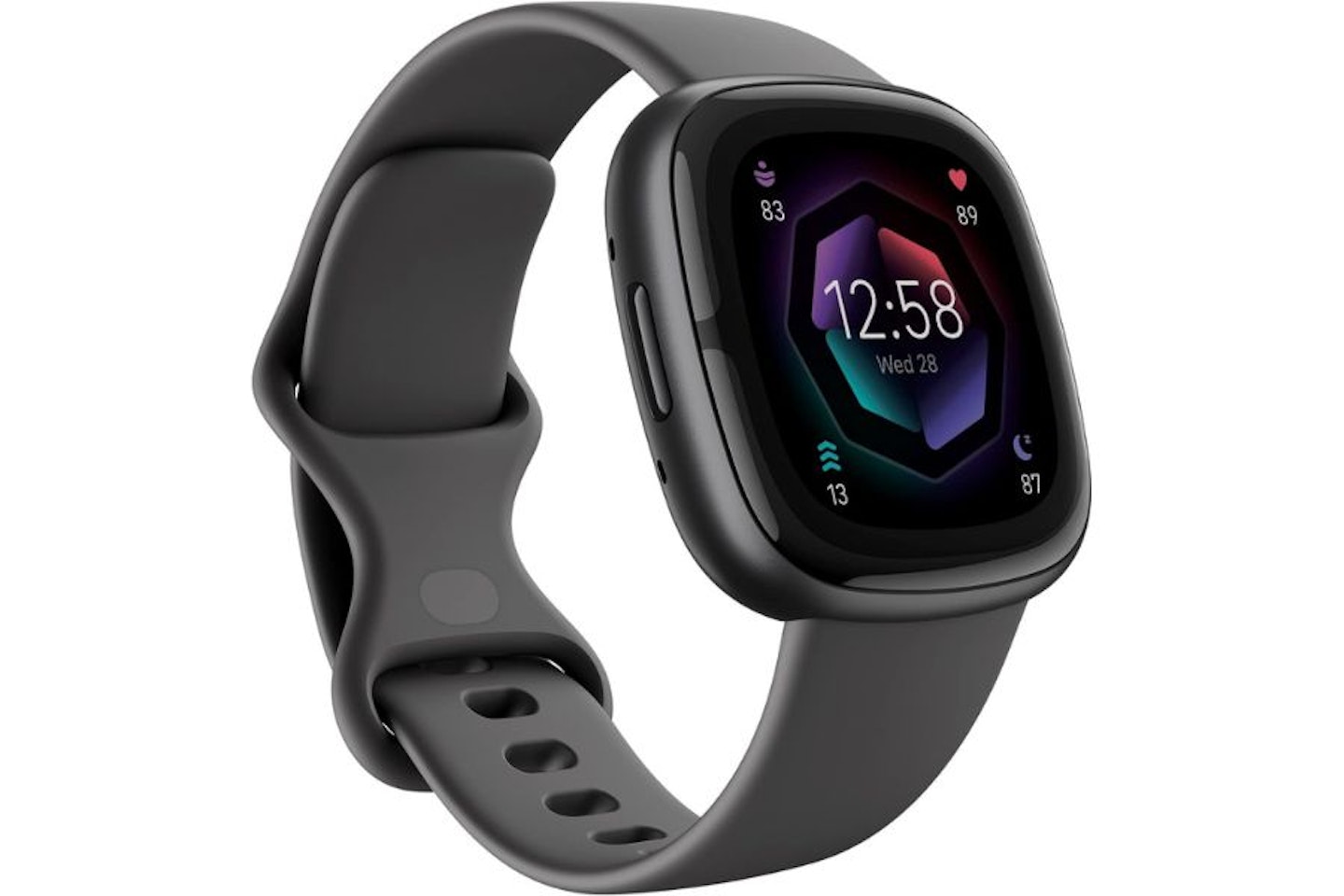 Fitbit
FitbitIf you want the most complete set of health monitoring metrics in a Fitbit, the Sense 2 is the choice for you. While many of the metrics it records are available on other Fitbits, it’s the only one that tracks floor climbing and guided breathing sessions. More impressively, it offers an electrocardiogram (ECG) app which can help detect atrial fibrillation, a common form of irregular heartbeat.
It’s also the only Fitbit that has a skin temperature sensor – which may indicate if you’re about to get ill – and a continuous electrodermal activity (cEDA) sensor built in. The cEDA sensor can help identify and alert you when you seem particularly stressed.
The Sense 2 offers comprehensive health and fitness tracking, as well as the ability to make and receive calls via Bluetooth on the watch itself, a built-in Alexa voice assistant, and support for Google Maps and Google Wallet. It is Fitbit’s most expensive device, with an RRP of £219.99, but if you want the most comprehensive health data on a Fitbit, it’s your best bet.
Pros
- Skin temperature sensor
- Comprehensive health and fitness tracking
- Large, bright display
Cons
- Limited smartwatch features
| Display | 1.34 Inches |
| Battery life | 6 days |
| Connections | Built-in GPS, Bluetooth |
| Compatibility | Apple iOS 15 or higher, Android OS 10 or higher. |
| Dimensions | 40.5mm l x 40.5mm w x 12.3mm h |
| Weight | 37.64 g |
- Customer review: "It's super efficient nice to wear. Gives me peace of mind with my heart problems. It's a five star from me"
Best Fitbit tech in a smartwatch
Okay, so technically, a Pixel Watch isn’t a Fitbit, but given all the Fitbit technology that was used to help build it, we think it deserves to be included. The Google Pixel Watch 2 is the best smartwatch Google has produced and is a much more complete smartwatch experience than other Fitbits. It has Google Assistant rather than Alexa, smart home controls, and plenty more. It even has some added safety features – for example, if you’re out running at night, you can set a timer that will tell your emergency contacts where you are if it expires with no response.
It offers all the health and fitness tracking of the Sense 2, plus some extras such as pace training when you’re running, heart zone training, and a new heart rate sensor that Google says is “the best heart rate tracking on any of our wearable devices”. If it was branded as a Fitbit, we’d call it a contender for the best Fitbit overall.
The Pixel Watch 2 is more expensive than any Fitbit device, the battery will struggle to last much more than a day, and it’s only compatible with Android phones. But it is a true smartwatch, and the added features will, for some people, justify the extra expense.
Pros
- A "full" smartwatch experience
- Accurate heart rate sensor
- Pace training for runners
Cons
- One day battery life
| Display | 41mm |
| Battery life | 24 hours |
| Connections | Wi-Fi, Bluetooth, LTE and built-in GPS |
| Compatibility | Android 9.0 |
| Dimensions | 41mm l x 12.3mm h |
| Weight | 31g |
- Customer review: "Overall though I think this is an excellent tool for fitness and also general use, it is practical, lightweight and comfortable and has good safety features. If you are looking for a smartwatch it should be one to add to your list of vendors from which to choose."
Best value Fitbit
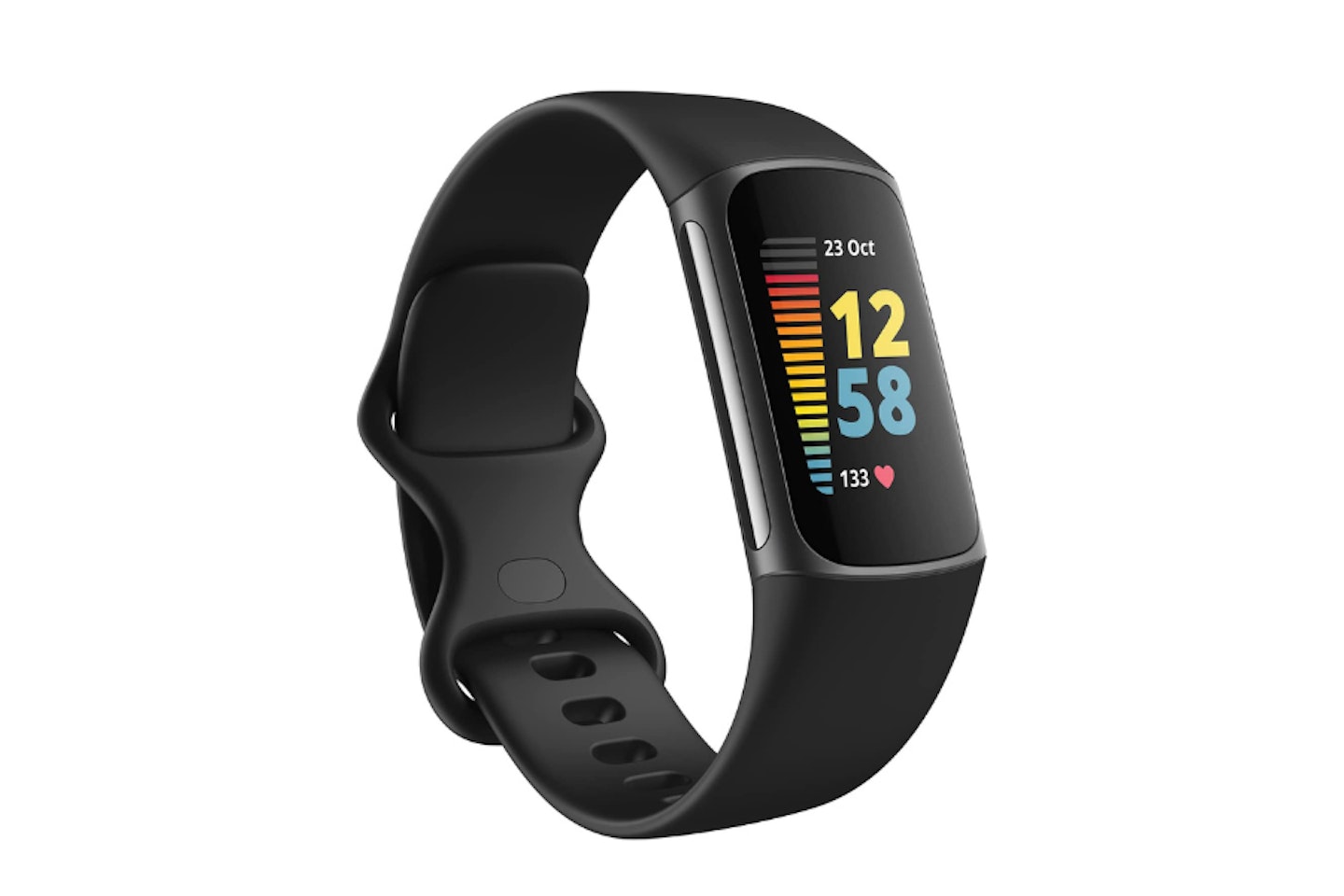 Fitbit
FitbitYes, the Fitbit Charge 5 is an older model, but if you’re looking for a quality health and fitness tracker at a relatively affordable price, it’s still well worth considering. It offers most of the health and fitness tracking of the newer, more expensive Charge 6. It’s got an excellent, bright display that’s larger than you’ll see on many fitness trackers, making it easy to read. And despite this, it is still relatively small and lightweight to wear.
Like the Charge 6, it also has built-in GPS for tracking walks, runs and bike rides without you needing to take your phone with you. Built-in GPs is relatively unusual in fitness trackers and tends to be more accurate than the connected GPS used by many of these devices. That alone makes it worth considering for anyone who likes to track their outdoor activity but doesn’t necessarily want to have to cart their phone with them everywhere.
Having been superseded by the Fitbit Charge 6, you should be able to find this on sale for considerably less than the £129.99 RRP it used to have (originally it was on sale for £169.99). We’ve seen it on sale for less than £100 during promotional periods, which makes this exceptionally good value.
Pros
- Built-in GPS
- Solid battery life
- Bright display
Cons
- Charge 5 has now been superseded by a newer model
| Display | 1.04 Inches |
| Battery life | Up to 7 days |
| Connections | Bluetooth and built-in GPS |
| Compatibility | Compatible with iOS 15 or higher & Android OS 9.0 or higher |
| Dimensions | H11.2, W22.79, D36.78mm. |
| Weight | 28 grams |
- Customer review: "I've been using the Fitbit Charge 5 for more than 6 months now, and I've been really impressed with it. It's a great fitness tracker that offers a variety of features, including built-in GPS, stress management tools, sleep tracking, and 24/7 heart rate monitoring."
Best Fitbit smartwatch
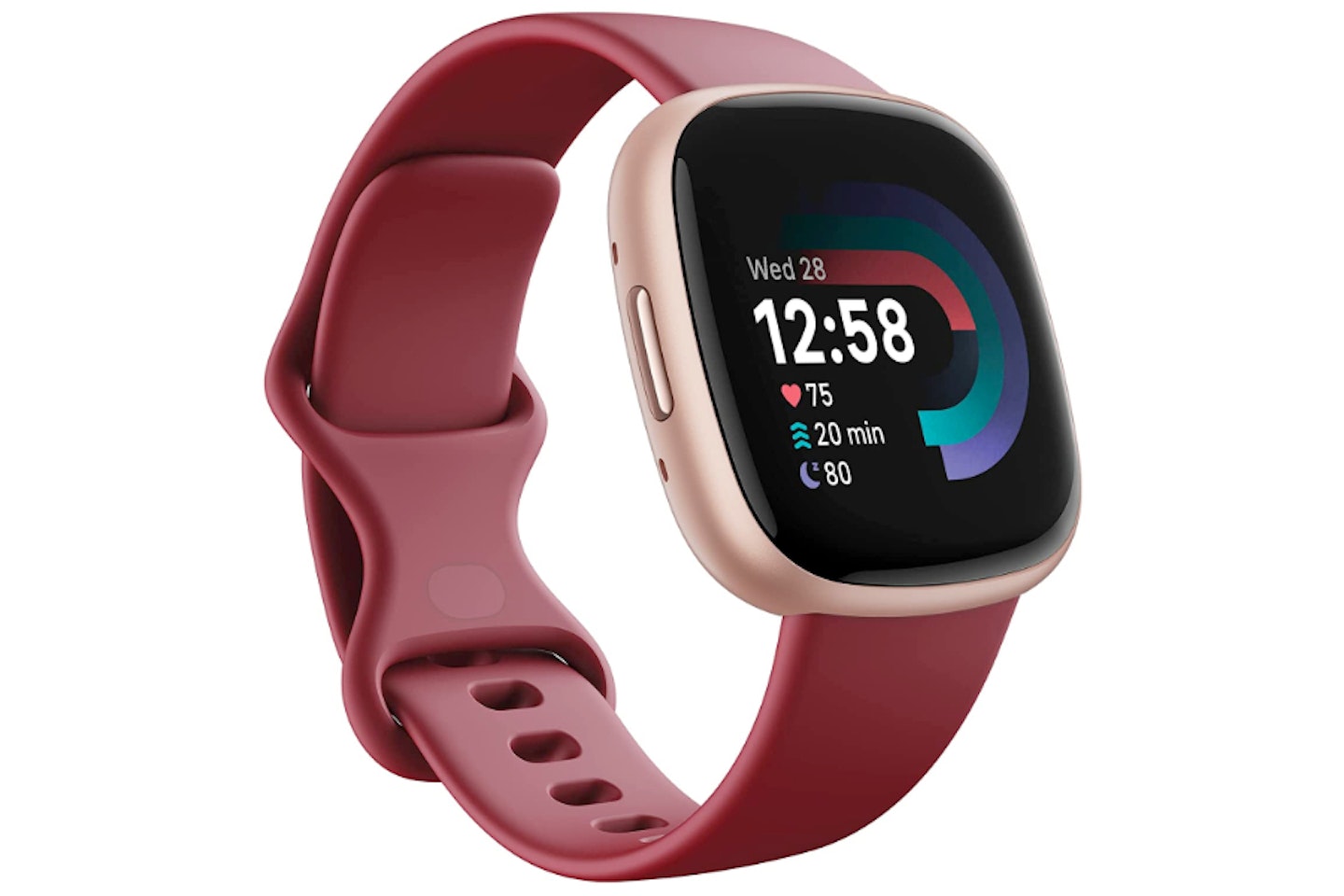 Fitbit
FitbitFitbit only offers two devices that can be considered close to being “true” smartwatches – the Sense 2 and the Versa 4, and we think the Versa 4 just edges it. In terms of smart features, the Versa 4 offers the same as those on the pricier Sense 2, including on-wrist Bluetooth calls, built-in Alexa, Google Maps and Google Wallet. The Versa 4 also provides almost all the same health and fitness tracking features, minus the skin temperature sensor and floor climbing.
We’d argue that if you want all the health and fitness tracking available, then the Sense 2 provides slightly more. Similarly, if you don’t need any smartwatch features, then the Fitbit Charge 6 arguably offers more, at a cheaper price. But for a device that bridges the gap between a fitness tracker and a smartwatch, the Versa 4 offers a little bit of everything in a stylish package. And with an RRP of £179.99 that’s usually discounted, it’s good value.
Pros
- The same smartwatch features as the more expensive Fitbit Sense 2
- Solid battery life
- Stylish design
Cons
- Lacks some health and fitness tracking features
| Display | 1.34 Inches |
| Battery life | 6 days |
| Connections | Bluetooth, Built-in GPS |
| Compatibility | Apple iOS 15 or higher, Android OS 10 or higher. |
| Dimensions | 40.5mm l x 40.5mm w x 11.2mm h |
| Weight | 38 grams |
- Customer review: "The Fitbit is very easy to navigate and works well with the app on phone. Not sure how I was going to get on with it at first but so far so good. Text messages, notifications and answering phone calls all works well. On the whole it's just very easy to use, comfortable to wear and connects well with my mobile . Would absolutely recommend it."
Best battery life Fitbit
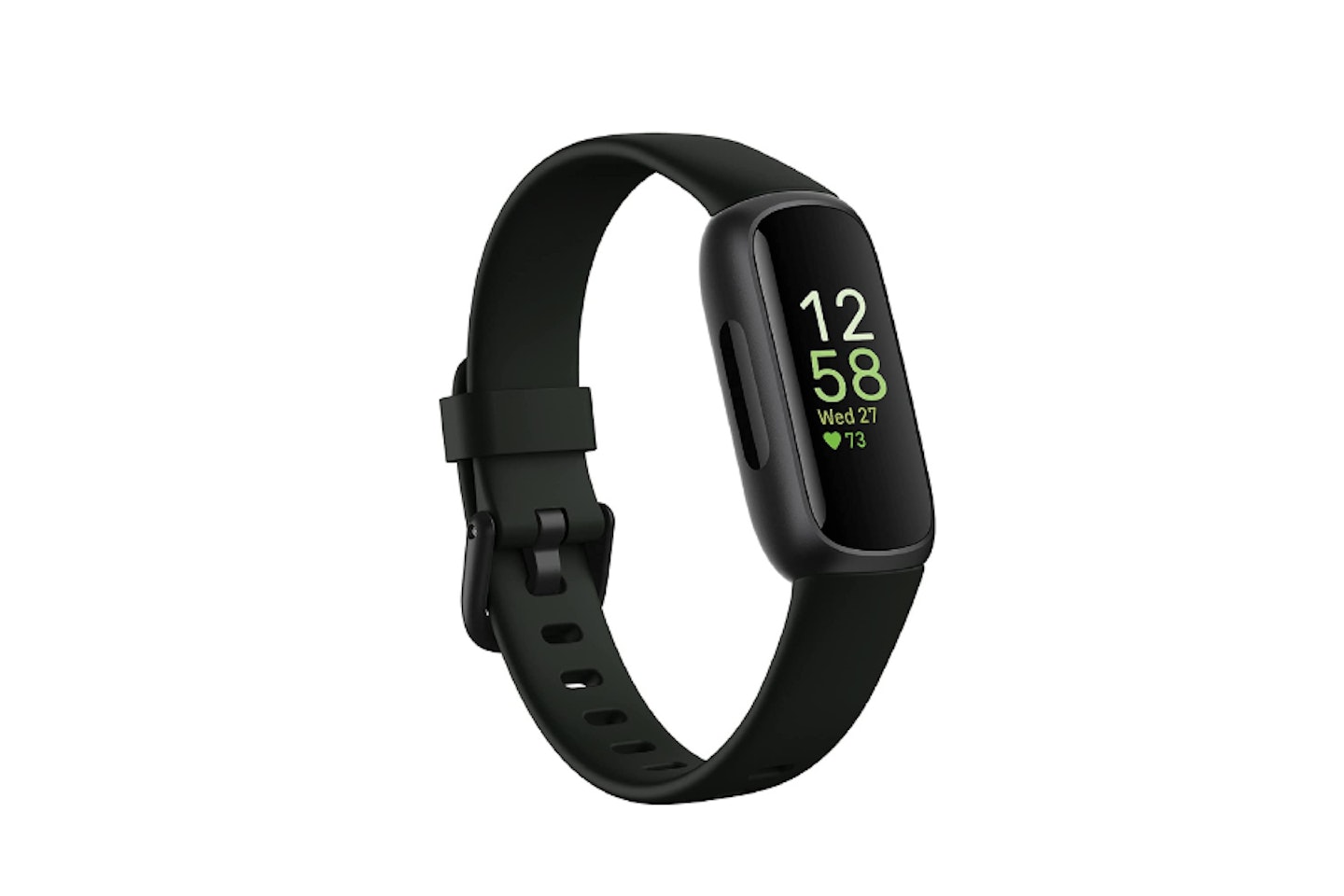 Fitbit
FitbitThe Fitbit Inspire 3 is one of Fitbit’s smallest and cheapest devices. Despite its size, it still comes with an impressive set of health-tracking features for fitness beginners or those who want something as small as possible on their wrist. Heart rate tracking, sleep, step, and calorie estimates, blood oxygen monitoring, and access to all the features of the Fitbit app means this fitness tracker has lots to offer.
While it doesn’t have as many features as the Fitbit Charge 6, it impresses with its 10-day battery life, which is significantly better than the five to seven days you can expect from other Fitbits. This is primarily because this device has a much smaller screen and no built-in GPS. But it does mean that if you want to go as long as possible between charges, the Inspire 3 is a good choice.
Pros
- Excellent battery life
- Lightweight and comfortable
- Simple to use
Cons
- Small display can be fiddly to use
| Display | 1.4 inches |
| Battery life | 10 days |
| Connections | Bluetooth, connected GPS |
| Compatibility | Apple iOS 15 or higher, Android OS 10 or higher. |
| Dimensions | 39.32mm l x 18.6mm w x 11.75mm h |
| Weight | 20 grams |
- Customer review: "Love it ..the battery last well over a week it records sleep heartbeat steps, oxygen levels, irregular heartbeats, skin temperature what more could you ask for?"
7.
Fitbit Luxe
Best Fitbit for comfort
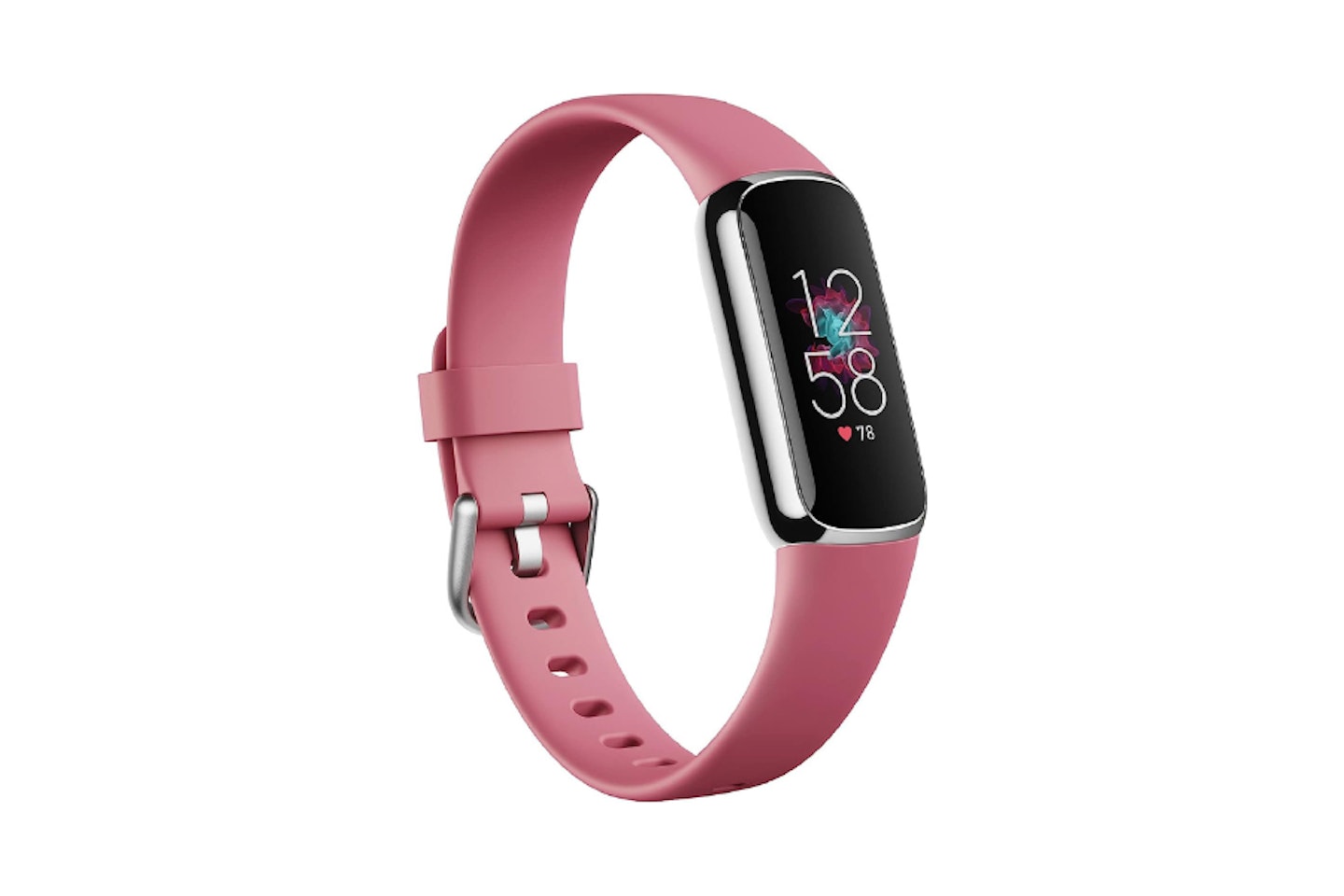 Fitbit
FitbitFor anyone who wants style as well as substance, the Fitbit Luxe is one to consider. It has a lot in common with the small size and health and fitness features of the Inspire 3. Battery life isn’t quite as good, at only around five days, but this is still acceptable for such a small device.
Where it stands out is in its design. Instead of a plastic case, the Luxe uses stainless steel in gold, silver or black. The buckle is also stainless steel, and there are plenty of accessories to make this about as close to a fashion statement as it gets. The small screen won’t be for everyone, as some may find it harder to read or to navigate. But it is very stylish and crucially still offers the high standard of fitness tracking you expect from a Fitbit.
Pros
- Stylish design
- Includes essential fitness tracking metrics
- Works with both Android and iPhone
Cons
- Underwhelming battery life
| Display | 0.96 inches |
| Battery life | 5 days |
| Connections | Bluetooth, connected GPS |
| Compatibility | Apple iOS 15 or higher, Android OS 10 or higher |
| Dimensions | 36.30mm l x 17.62mm w x 10.05mm h |
| Weight | 26 grams |
- Customer review: "I saw one of these on a friend’s slim wrist and knew it was for me. I’m delighted with the way it looks and feels - no surprise there - but also amazed at how it has alerted me to how to live a healthier life. Beautifully made and a real game changer."
Buyer’s Guide:
How do I know which Fitbit is best for me?
What’s your budget?
Working out how much you are willing to spend will also make your decision easier. If you don’t want to spend a lot, then cheaper fitness trackers like the Inspire 3 or Charge 6 will probably be more suitable than the more expensive models such as the Sense 2 or Pixel Watch 2.
Conversely, if you’re willing to spend a bit more, that gives you access to features that you would potentially miss out on with those cheaper devices.
What features do you need?
It’s important to decide which features you regard as essential, nice to have, or irrelevant. If you aren’t bothered about smartwatch features such as making calls, then you probably don’t need to spend more on a Versa or Sense smartwatch. If your exercise routine focuses on being at the gym, do you really need built-in GPS? If not, then an Inspire 3 might do everything you want. Is checking your heart health important, or are you more concerned about tracking your step count to try and increase your activity levels? Figuring out the essentials to fit in with your lifestyle and habits will help you narrow down your choice.
What are your goals?
The features you need will be linked to your goals. If you’re just getting started on a fitness journey, you may not need all the bells and whistles, and something that just tracks your activity levels may suffice.
Conversely, if you already exercise regularly, you might need something with more advanced features. For example, maybe you have a target time in mind for your next 10k run. In that case, a device that offers features such as pace training, like the Pixel Watch 2, may be more suitable for you.
What’s your design preference?
Fitbits come in a variety of shapes and sizes, so decide whether you prefer the slim and lightweight feel of a fitness tracker, or if you prefer the look of a smartwatch, which is bigger and more like a traditional wristwatch. Also think about whether you’d prefer a touchscreen or buttons to navigate around the device.
FAQ: Your Fitbit questions answered
Is Fitbit battery life good?
The battery life on Fitbits is respectable, although not the best on the market. For comparison, some of the best Garmin watches will last at least a couple of weeks, while the Huawei Band 7 – one of the best budget fitness trackers - also lasts up to 14 days. Typically, you should expect most Fitbits to last around five to seven days between charges, with the Fitbit Inspire 3 lasting up to 10 days. This will depend on how you use it, and which features you turn on or off.
What about Fitbit smart notifications?
Fitbits are designed to alert you to app notifications, phone calls or text messages. The more basic fitness trackers won’t do much more than this, while the more advanced devices – such as the Sense 2 – will also allow you to make and receive calls on your wrist, via Bluetooth.
The Sense 2, Versa 4 and Charge 6 also incorporate Google Maps and Google Wallet functionality.
Can I use a Fitbit for contactless payments?
Yes, Fitbits support contactless payments. Older models use Fitbit Pay, and newer models incorporate Google Wallet.
Note: Google has confirmed that Fitbit Pay is being discontinued, and will cease to operate from July 29, 2024. This will eventually be replaced by Google Wallet, which is far more widely accepted. Any devices launched after November 2022 will automatically use Google Wallet, while users of older devices will be prompted to set up Google Wallet to replace Fitbit Pay.
Are Fitbits waterproof?
According to Google, most Fitbit devices are water resistant to 50 metres, meaning they are fine to take swimming or wearing during an intense and sweaty gym session. You will need to bear in mind the type of strap you are wearing, as leather, metal and woven materials aren’t designed to get wet. If you plan on regularly getting your Fitbit wet, we recommend choosing a silicon strap.
How accurate are Fitbits?
No smartwatch or fitness tracker is completely accurate all the time. Over the years, as sensors have become more sophisticated, and the amount of data available to these companies has grown, it’s fair to say that accuracy has improved significantly.
The real question is whether these devices are accurate enough. While Google provides its own guide to Fitbit accuracy, academic studies suggest that Fitbits provide “acceptable accuracy” when it comes to step counts but are potentially less reliable when estimating energy expenditure.
We suggest using any data you get from your Fitbit (or any other tracker) as a guideline rather than as definitive. You can still use these devices to help motivate you and give you a sense of your general activity levels. If you see that you’re taking more steps per day than a month ago, chances are that will be an accurate reflection of increased activity levels, even if the specific numbers aren’t perfect.
Do Fitbits come with GPS?
Fitbit fitness trackers and smartwatches use one of two types of GPS: built-in GPS, where a GPS tracker is incorporated into the device, or connected GPS, which uses the GPS on your phone to track where you are. More premium models, such as the Sense 2 and Charge 6, have built-in GPS, which tends to be more accurate. Less expensive models such as the Inspire 3 use connected GPS, which is slightly less precise, but does make the device itself marginally cheaper.
What health and fitness monitoring features does a Fitbit offer?
Fitbit is well known for its comprehensive health and fitness tracking metrics. While specific features vary between models, and some features are only available on Fitbit Premium, the following can all be measured by Fitbit devices:
• Blood oxygen tracking.
• Heart rate monitoring, including resting heart rate, heart rate variability, irregular heart rhythm notifications, and an ECG (electrocardiogram) app.
• Menstrual health tracking.
• Skin temperature.
• Sleep tracking, including a breakdown of sleep stages and sleep profile.
• Stress management score.
• Active zone minutes (which tracks your time in heart rate zones during exercise).
• Exercise tracking.
• Step, distance and calorie estimates.
• Daily readiness score – this tells you whether your body is ready to work out or needs time for recovery.
What Fitbit accessories are there?
As with most brands, Fitbit makes sure that you can add a degree of personality to your device, primarily with swappable wristbands. Different materials, colours, and designs are available for your chosen Fitbit. There are plenty of third-party options available as well.
Fitbits come with a proprietary charger designed to work specifically with certain devices. The charger used for the Charge 5 and 6 is different to the charger for the Inspire 3, for instance. Some Fitbits, including the Sense 2, Versa 4, Charge 5 and Charge 6, are also compatible with some wireless chargers.
What devices are Fitbits compatible with?
Most Fitbits are compatible with Android and iOS devices, phones and tablets. In other words, if the relevant app store has a Fitbit app available to download, your Fitbit will work with your device. The one notable exception is the Pixel Watch series, which is only compatible with Android devices.
What’s next for Fitbit?
Wearable technology has come a long way since the early days of fitness trackers. But there’s still plenty of room for further development. A big trend now is smart rings, such as the Oura Ring, and Samsung’s new Galaxy Ring, which is set for release later in 2024. Is it possible that Fitbit might introduce a smart ring of its own?
Beyond that, companies are constantly finding ways to make sensors more accurate and introduce new features as well. We’d love to see improved battery life, and 24-hour temperature tracking (as opposed to night-time only) would be useful for potentially indicating onset of illness, as well as helping manage your exercise load.
Steven Shaw is a Senior Digital Writer covering tech and fitness. Steven writes how-to guides, explainers, reviews and best-of listicles covering a wide range of topics. He has several years of experience writing about fitness tech, mobile phones, and gaming.
When Steven isn’t writing, he’s probably testing a new smartwatch or fitness tracker, putting it through its paces with a variety of strength training, HIIT, or yoga. He also loves putting on a podcast and going for a long walk.
Subscribe to the What’s The Best Newsletter to keep up to date with more of the latest reviews and recommendations from the What’s The Best team.
